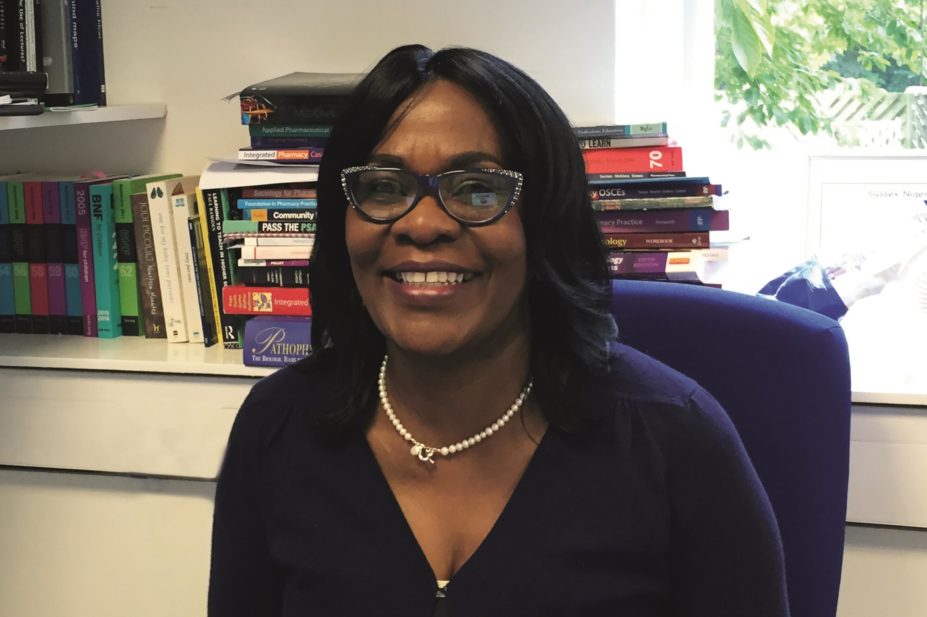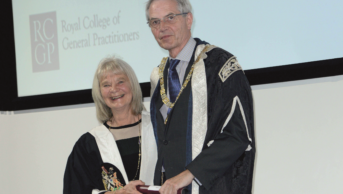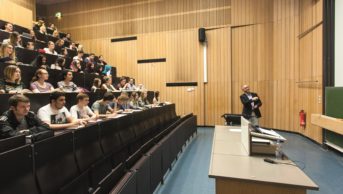
Courtesy of Bugewa Apampa
In July 2016, Bugewa Apampa became one of just 18 black female professors in the UK. Quoting statistics published by the Runnymede Trust, Apampa says that of the 18,500 professors in the UK, 92.4.% are white, fewer than 0.5% are black and fewer than 0.1% are female and black. While she says she considers it a privilege to be a role model for black or minority ethnic (BME) students, she strongly believes that by not recruiting black pharmacists to higher positions, the country is missing out on some of the best talent.
“If you look within pharmacy, black pharmacists represent a significant population but I don’t think they are represented in high level posts,” she says. “We are inadvertently perpetuating pervasive stereotypes that perhaps this person is less able, which is not true. If we’re not represented in high level leadership positions then it’s difficult to get away from people thinking that ‘it’s not for people like me’.”
Apampa says that it is primarily because of the environment at the University of Sussex, where she has recently launched a new pharmacy degree within the school of life sciences, that she has been able to be so successful. “[Becoming a professor] is something I didn’t envisage happening until I came to Sussex. Sussex is known to be liberal, accepting and inclusive, and the life sciences [department] recently got the Athena Swan silver, which recognises the fact that they promote opportunities for women – it’s not just lip service, they actually do.”
From Benin to Britain
Apampa originally graduated from the University of Benin, a small town in the Edo State of southern Nigeria. From the beginning, she stood out — she was given the first 1st class honours awarded in four years by the university for her pharmacy degree.
In Nigeria, individuals in higher education must complete one year of national service. So, after her preregistration training in a local hospital, Apampa worked in a specialist hospital in the northern part of Nigeria. However, on the back of her 1st class degree, she was awarded a scholarship to do a PhD in the UK.
“I moved to the UK in 1983 and went to the University of Manchester where I started by doing a masters in pharmacology. Straight after that I went into the PhD, which involved me characterising the biology and pharmacology of interleukin 1 beta,” she explains.
Into the community
After achieving her PhD, Apampa got married and decided to have children. On returning to work, however, she believed that practising pharmacy, rather than returning to academia, would enable her the flexibility to work and be a mother. She therefore applied to the then Royal Pharmaceutical Society of Great Britain (RPSGB) to register and complete the exams required for pharmacists who have trained overseas, before beginning her preregistration training in August 1990. “My preregistration training was under 12 months,” she remembers. “In those days, my tutor felt I was competent so got me signed off early!”
Apampa’s first job was as a pharmacy manager, working for a supermarket multiple, where her role required her to set up the pharmacy. “I was just given this space,” she recalls, “I had to start it all off; I was involved in the hiring of staff and locum pharmacists. In those days we didn’t even have standard operating procedures (SOPs).” Establishing this pharmacy is one of Apampa’s greatest achievements. “It’s still there,” she says, “and the people I trained are all there. The pharmacy is very successful.”
Strategy and audits
After working there, Apampa responded to a call for interested community pharmacists to be trained to provide clinical governance services to GP practices around audits. She was accepted and allocated to a GP practice where her first audit report was on the use of statins. “One of the doctors… asked me to audit his benzodiazepine prescribing and come up with an action plan to switch patients from the short acting, but addictive, benzodiazepine to the longer-acting benzodiazepine so they could eventually be weaned off the drugs,” she explains.
The chief pharmacist invited Apampa to apply for the position of project director in Welwyn Hatfield. Here, she carried out Welwyn Hatfield’s first pharmaceutical needs assessment ahead of the new community pharmacy contract framework, which was published in April 2005. “[The assessment] was multidimensional,” she says. “I worked with the public health intelligence unit and found that deprived areas didn’t have the pharmacy services that you’d expect and all of the services were clustered in the city centre, which was an affluent area. The director of public health came and told me it was a fantastic document.”
The role then led to Apampa becoming community pharmacy lead, where she represented community pharmacy on the board of the primary care trust (PCT), the then commissioning bodies of the NHS. “Traditionally, PCTs had hospital pharmacists running the medicines management service on the back of a clinical diploma they did while training in hospital, but they didn’t really have community pharmacy experience,” she explains.
Apampa decided to register for a clinical diploma in clinical pharmacy for primary care herself. “[The diploma] was one of the best qualifications I ever did, because it makes you look at a prescription in a different way — it makes you listen to a patient in a different way.”
After realising the benefits of her clinical diploma, Apampa says she now believes that education and training for community pharmacists needs to be structured throughout their careers, in addition to continuing professional development. “Community pharmacists have significant skills but I believe they could upskill themselves by engaging with structured training,” she says. “The Centre for Pharmacy Postgraduate Education is good but I don’t think it is sufficient. It’s not rigorous enough. You need to go and do postgraduate education and develop — there’s always something new to learn.”
Returning to academia
In 2005, after a year at the PCT, Apampa returned to academia at the recently opened Medway School of Pharmacy, a collaboration between the universities of Kent and Greenwich. Here, in her role as the director of learning and teaching, she worked directly with the then head, Clare Mackie. “I always found Clare inspirational,” explains Apampa. “She used to be a community pharmacist and was appointed a professor, so I was like, ‘wow this is possible!’
“It was a fantastic opportunity — the new school helped me to get back into academia, and I don’t think it would have happened otherwise.” Apampa admits that the transition from being a community pharmacist to re-entering the academic environment was the biggest challenge in her career.
Apampa was in the role for just under two years before becoming deputy head of the school in June 2007. In 2011, she was asked to lead on the reaccreditation of the pharmacy degree in line with the new General Pharmaceutical Council (GPhC) standards. “I spent a long time researching pharmacy and medical education, internationally and nationally, to find the best kind of curriculum for pharmacy education that would comply with the GPhC future pharmacy standards,” she recalls. “We went forward to the accrediting panel in May 2013. It went through with no conditions and no recommendations.”
Building compassion
From Medway, Apampa moved on to the University Sussex to become the director of pharmacy development and, in this role, led the launch of a new professional pharmacy degree in the school of life sciences that saw its first cohort of students in September 2016.
Apampa says she does not agree that there are already too many schools of pharmacy and emphasises that each pharmacy school offers something different. “Each pharmacy school has its ethos — we have a vision of what we were trying to do and our vision is about producing compassionate carers,” she explains. “All of my students are certified first aiders and they’ve all had their homelessness awareness training.” She adds that, as part of a cultural competency scheme, students will be helping homeless individuals on Brighton beach, and will visit a home for disabled children.
Apampa believes that everyone is guilty of unconscious bias but, if people become self-aware and undergo unconscious bias training, improvements can be made. “I am a black African woman but even I have biases. I have to think in every situation about the platinum rule – do the best for this person; treat them as they want to be treated,” she says.
“I want my students to go and learn that we have a diverse population — diversity is not just about ethnicity, it’s about gender, it’s about disability. I believe that’s how you build compassion.”
- This article was amended on 8 November 2016 to clarify that Apampa set up a new pharmacy degree within the school of life sciences, not a new school of pharmacy as previously stated.


